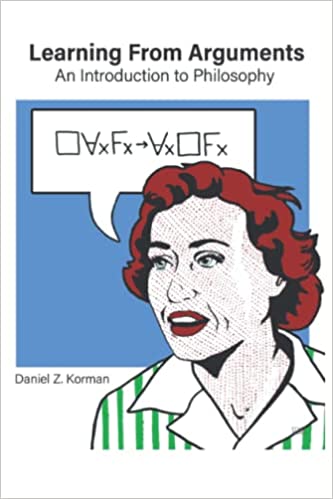
|
FreeComputerBooks.com
Links to Free Computer, Mathematics, Technical Books all over the World
|
|
- Title Learning from Arguments: An Introduction to Philosophy
- Author(s) Daniel Z. Korman
- Publisher: Independently published (August 5, 2022); eBook (Creative Commons Licensed)
- License(s): CC BY NC
- Paperback: 247 pages
- eBook: PDF (248 pages)
- Language: English
- ISBN-10/ASIN: B0B8RCG9HZ
- ISBN-13: 979-8844222580
- Share This:

|
This book advances accessible versions of key philosophical arguments, in a form that students can emulate in their own writing, and with the primary aim of cultivating an understanding of the dynamics of philosophical argumentation.
The book contains ten core chapters, covering the problem of evil, Pascal's wager, personal identity, the irrationality of fearing death, free will and determinism, Cartesian skepticism, the problem of induction, the problem of political authority, the violinist argument, the future-like-ours argument, the ethics of eating meat, utilitarianism (both act and rule), and the trolley problem.
Each of the ten core chapters offers a sustained argument for some controversial thesis, specifically written for an audience of beginners. The aim is to introduce newcomers to the dynamics of philosophical argumentation, using some of the arguments standardly covered in an introductory philosophy course, but without the additional hurdles one encounters when reading the primary sources of the arguments: challenging writing, specialized jargon, and references to unfamiliar books, philosophers, or schools of thought.
About the Authors- N/A
 Similar Books:
Similar Books:
-
 Words of Wisdom - Introduction to Philosophy (Jody Ondich)
Words of Wisdom - Introduction to Philosophy (Jody Ondich)
Philosophy is the study of wisdom, and can emerge in our conversations in social media, in school, around the family dinner table, and even in the car. The text uses materials that are 2,500 years old, and materials that were in the news this year.
-
 Paths: Why is Life Filled with so many Detours?
Paths: Why is Life Filled with so many Detours?
This book explores the amazing similarity between paths taken by people and many other things in life, and its impact on the way we live, teach and learn. Offering insights into the new scientific field of paths as part of the science of networks, etc.
-
 Why Knowing What To Do Is Not Enough?
Why Knowing What To Do Is Not Enough?
It explains the reasons for the gap between 'knowing' and 'doing', focuses on the role of non-cognitive capacities, such as setting goals, taking action, persevering and coping with setbacks, and shows how these capacities are undermined by adverse circumstances.
-
 Train Your Brain: Build a Framework for Clear Thinking
Train Your Brain: Build a Framework for Clear Thinking
This book will help you build a mental framework for clear thinking. With daily practice you can build your skills in clear thinking, and become a more productive and happier person. The basic anatomy of the brain is presented.
-
 What is and What will be: Integrating Spirituality and Science
What is and What will be: Integrating Spirituality and Science
This book integrates science with values and meaning by making the simplest possible assumption about the connection between physical structure and conscious experience. This follows from Gödel's Incompleteness Theorem and the assumptions of this book.
-
 Motivation: How To Enjoy It Every Day (David Valois)
Motivation: How To Enjoy It Every Day (David Valois)
21 Secrets To Get Motivated - Even If You Are In The Most Difficult Situation! Do you want to know what do high motivated achievers that others don't? Then you need MOTIVATION. And here you will discover how.
-
 Mind Hacking: How to Change Your Mind for Good in 21 Days
Mind Hacking: How to Change Your Mind for Good in 21 Days
Teaches you how to reprogram your thinking - like reprogramming a computer - to give you increased mental efficiency and happiness. Learn to take charge of your mind and banish negative thoughts, habits, and anxiety - in just 21 days!





